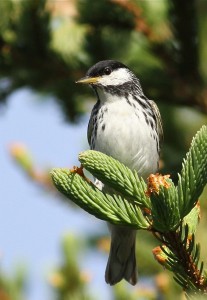Polling all Blackpolls

Blackpoll Warblers have among the highest pitched of all bird songs in North America. Most anyone who lives in the east (and can still hear it) should hear the loud “see-see-see-see-see…” of a Blackpoll at some point during spring migration. Listen to enough of them and you will doubtless notice a great deal of variation in the speed and particular note characteristic of the song.
However, there isn’t a whole lot of specific information in the field guides on the variability of Blackpoll Warbler songs. BNA does says of the speed: “Rate varies from 5 to 12 notes/s (Dunn and Garrett 1997), and frequency averages 8,900 hz (range 8,050–10,225 hz; Brand 1938; Fig. 3)” But it also says “No information on geographic variation”, and there is little other information on variation in Blackpoll Warbler song.
On my first trip to northern Coos County, New Hampshire (in 2008), I heard a very high pitched, very fast trill that I did not recognize. Upon tracking it down I was rather surprised to see it was a singing Blackpoll Warbler. I kept an ear out the rest of that day and found a half dozen or so Blackpoll Warblers, all singing that song. When I counted up how many notes per second the song contained I found that it was 19, well over the top end of the range mentioned in BNA. Upon mentioning this weird song type to a friend of mine from New Hampshire (Ben Griffith) he said that birders in the state were aware of this local dialect, and that all the birds up around Pittsburg, NH, sang like this, and none of the birds elsewhere in the state did.
This rather piqued my interest, so I’ve been keeping an ear out for singing Blackpolls ever since.
From what I’ve been able to find, my friend in NH is right about the very limited range of the super-fast song type. A few miles to the south, and even closer to the east, birds sing more normally paced songs (from Jefferson Notch, NH, and Saddleback Mt., ME, respectively). I have also heard many migrant Blackpolls at a number of locations from Ohio to Maine, and none of them sang fast songs like the NH birds.
Interestingly, a migrant bird recorded in E MA by Ian Davies (recording below) has a fast pitched song like the Coos birds. While it’s impossible to say for sure that this bird is from the Northern NH population, I would bet money that it is – E MA is directly south of these birds.
So if any of you hear Blackpoll Warblers regularly, or are heading to where you might, keep an ear out and let me know how fast they are singing…I’d be interested to know!
6 thoughts on “Polling all Blackpolls”
Hi Andrew,
I really enjoyed this post on Blackpoll Warblers. I read it right after hiking in the Adirondacks, where I actually had a discussion about variability in Blackpoll songs. I did not hear any fast songs while hiking Hurricane Mt. on this latest trip, but I’m fairly confident that I have heard fast songs from Adirondack Blackpolls in the past. And, I also think that I heard some fast songs from migrant Blackpolls here in Ithaca this spring. Fortunately, I don’t have to rely entirely on my memory (which can sometimes be “creative”) on this topic, as I’ve actually recorded a fast Blackpoll songster on the summit of Gore Mt. in northern Vermont:
http://macaulaylibrary.org/audio/136158
On the same summit, I also recorded this individual:
http://macaulaylibrary.org/audio/136160
So, I definitely have some familiarity with these fast songs from time in the field in New York and Vermont. But, I would also describe them as uncommon, at best. I’ll have to pay special attention to Blackpoll songs when I hike my next High Peak!
Matt
P.S. Have you checked the ML collection to see if there are any other fast songs?
Thanks for this post Andrew! I have also heard occasional fast songs from migrants in the east, but never imagined that they all might have a “home”. There’s quite a bit of other geographic variation in songs of Blackpolls, some of which I had noticed in the field and the Macauley recordings seem to confirm it now that I’ve listened carefully. I’ve posted some of this at my website but there’s lots more study needed.
Hi Andrew,
Paul Driver has recordings of Blackpolls passing through PA during spring migration that exhibit a range of song rates (http://pjdeye.blogspot.com/2009/03/several-warbler-species-sing-two.html; Blackpolls just over halfway down post). Too bad we don’t know their provenance…
Adam
We have a few thousand ten minute recordings of birds in the Hudson Bay/James Bay area from the past two summers. I *thought* we had some fast singing blackpolls last year, so when I get back home I’ll check (Excel tells me we captured 30 blackpoll songs in 2010). Right now I’m working on recordings for this summer so I’ll keep my ear open for faster than normal singers, and will send you a note when I’m done even if it is just to mention none of them sang faster than 12 notes/sec.
(sorry, no tree sparrows recorded last year, or this year)
p.s. ignore the tree sparrow comment, Andrew…that was for Nathan who asked me to listen for those last year. Sorry.
I remember one spring maybe 10 years ago where I encountered a super fast thin sounding Blackpoll just to the east of Ithaca in Dryden. Very different and very distinctive.
Comments are closed.